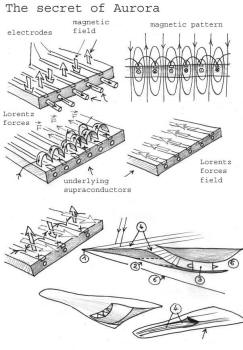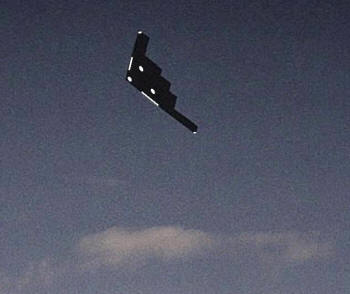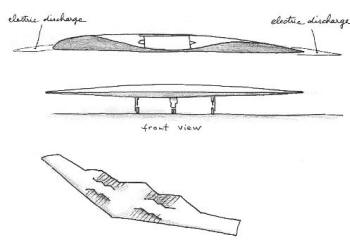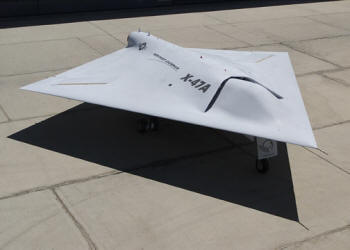|
One can shift to strato-reactor (below right). At Mach number up to Mach 6.5 scramjets can be used (below). The leading edge is cooled by liquid hydrogen an oxygen circulations. The mixture burns in annular combustion chamber at supersonic velocity. Over Mach 6.5 it seems difficult to go faster, due to the very high temperature (caused by air recompression through a strong shock wave). Some years ago the Russian revealed that they had a project called "Ajax", designed for very high Mach numbers.
Next, we find two images taken in an hypersonic wind tunnel showing Ajax tests. We see than the general design looks like the drawings of what was supposed to be "Aurora" or the "Aurora project". As we can see the upper part of such models is flat.
Ajax with statos Fraidstadt, the designer of Ajax, gave an interesting and surprising information. This machine was supposed to fly at hypersonic velocities with... conventional turbo-reactors. In addition the flight was possible if MHD system was operated. Ajax was never finished, due to the lack of money in Russia.
Aurora was the "American Ajax", based on the same concepts. Starting from this it was not difficult, through discussions with American researchers involved in Aurora program to discover the secret of such flying machine. The reader will discover it on the next set of figures. On the first one you find the general design of the "wall converter", invented in many places at the end of the sixties. I personally experienced wall converters in my lab in the seventies. A set of linear electrical conductors creates a quite peculiar magnetic field geometry, shown on the right, "spatially periodic".
This is couples to a set of linear
electrodes. If we decide to use this wall MHD converter as a wall
MHD accelerator, one injects electric power. Then it is easy to see
than the device produces a Lorentz force field parallel to the wall
(acting, for example, in the boundary layer).
The ordinary inlet (2) is closed. The air is admitted through a new inlet, located on the upper part of the airplane (4). We have figured the Mach lines, schematically. The Mach number decreases continuously from high value to subsonic regime. As the kinetic energy of the gas is partially converted into electricity its temperature remains low enough. The electric energy is used to increase the exhaust velocity in (5), using a wall MHD accelerator.
The whole implies what people now calls
"MHD by-pass". Notice a conventional turbo-reactor implies some
"mechanical bypass" for a part of the energy produced by the
combustion of fossil fuel is transferred to the front part of the
machine, at the compressor.
All this implies a great knowledge in
two-temperatures plasma physics, a field that was completely
abandoned in Europe at the beginning of the seventies.
Two-temperature plasmas, combined to high Hall parameters values
experience violent Velikhov instability (which caused the complete
failure of the civil programs in many countries, ended at the
beginning of the seventies). This had to be solved through original
solutions (plasma stabilization by magnetic confinement effect)
whose description is over the scope of the present paper.
But, as explained by American
specialists, when the machine flies at 2000,000 feet conventional
rockets provide additional thrust, so that the airplane becomes a
low altitude orbiter (its range becomes .. infinite). It becomes a
perfect spy-plane, able to take very good pictures of the ground. If
desired, the machine may turn like the "silver surfer". It a "pilotable
orbiter". Completely surrounded by plasma it is fully stealth.
Civilian applications
The US Air force says that this bomber
can operate from US at huge distances: 30,000 miles and go back home
immediately. Of course this implies several refueling and a long,
very long flight time. A specialist will notice that the B2 bomber
has a crew limited to two pilots. There is no cabin to take rest in,
as in the old B-52, designed for long duration missions. Remember
that the crew of B-52 could be composed by 6 men. Over very long
missions three took care of the plane, while the three others could
take place in the rest cabin.
These lights at the leading edge cannot
correspond to water condensation for the Mojave desert is very very
dry. The three elliptic spots correspond to lamps attached to
landing gear. We think that these white bars correspond to MHD
controlled inlet at low altitude, as confirmed later by the
specialists of the Edwards base.
The strength of the discharge modifies the local value of the velocity of the sound. The geometry of the two high voltage discharges, et the stagnation point and at the end of the profile modifies the flow, the drag and the relative width of the wing. There is no canopy, for it is non longer necessary. As shown on the figure the modern hypersonic US bomber is very flat, very stealth. It can take off from an airport based in USA, fly to Kabul and be back in a single night. The hypersonic bomber represents also the future civil transport, able to take people from New York to Tokyo in two hours.
US own hypersonic stealth drones with similar air intake. Naive people still believe they are designed to be subsonic.
|







